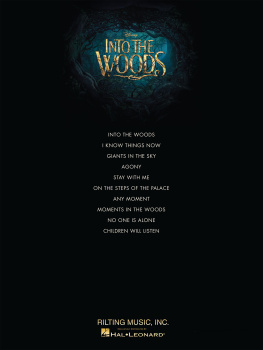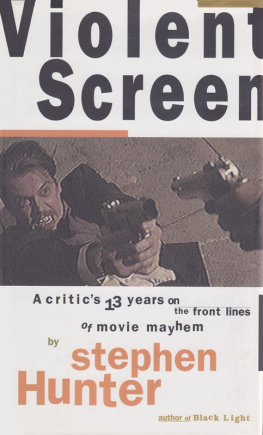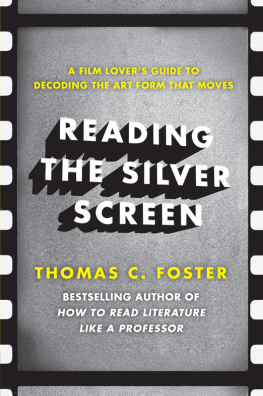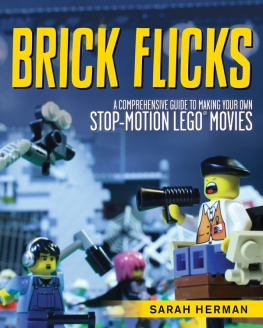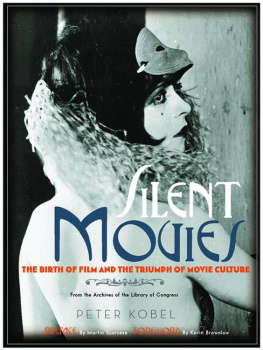Stephen Lowenstein - My First Movie: Take Two: Ten Celebrated Directors Talk About Their First Film
Here you can read online Stephen Lowenstein - My First Movie: Take Two: Ten Celebrated Directors Talk About Their First Film full text of the book (entire story) in english for free. Download pdf and epub, get meaning, cover and reviews about this ebook. year: 2008, publisher: Pantheon, genre: Detective and thriller. Description of the work, (preface) as well as reviews are available. Best literature library LitArk.com created for fans of good reading and offers a wide selection of genres:
Romance novel
Science fiction
Adventure
Detective
Science
History
Home and family
Prose
Art
Politics
Computer
Non-fiction
Religion
Business
Children
Humor
Choose a favorite category and find really read worthwhile books. Enjoy immersion in the world of imagination, feel the emotions of the characters or learn something new for yourself, make an fascinating discovery.

- Book:My First Movie: Take Two: Ten Celebrated Directors Talk About Their First Film
- Author:
- Publisher:Pantheon
- Genre:
- Year:2008
- Rating:5 / 5
- Favourites:Add to favourites
- Your mark:
- 100
- 1
- 2
- 3
- 4
- 5
My First Movie: Take Two: Ten Celebrated Directors Talk About Their First Film: summary, description and annotation
We offer to read an annotation, description, summary or preface (depends on what the author of the book "My First Movie: Take Two: Ten Celebrated Directors Talk About Their First Film" wrote himself). If you haven't found the necessary information about the book — write in the comments, we will try to find it.
Stephen Lowenstein: author's other books
Who wrote My First Movie: Take Two: Ten Celebrated Directors Talk About Their First Film? Find out the surname, the name of the author of the book and a list of all author's works by series.
My First Movie: Take Two: Ten Celebrated Directors Talk About Their First Film — read online for free the complete book (whole text) full work
Below is the text of the book, divided by pages. System saving the place of the last page read, allows you to conveniently read the book "My First Movie: Take Two: Ten Celebrated Directors Talk About Their First Film" online for free, without having to search again every time where you left off. Put a bookmark, and you can go to the page where you finished reading at any time.
Font size:
Interval:
Bookmark:
My First Movie: Take Two
Table of contents
My First Movie
About the author
Stephen Lowenstein is the author of My First Movie . He has worked on British television documentaries for Channel 4, ITV, and the BBC. He is the writer-director of two critically acclaimed short films and currently has several feature-length projects in development in England and the United States. He lives in London.
My First Movie: Take Two
Copyright information
First published by Pantheon Books, 2008
ISBN 978-0-375-42347-5
Copyright Stephen Lowenstein
All Rights Reserved
No part of this publication may be reproduced, stored in any retrieval system, or transmitted in any form or by any means, without the prior permission in writing of the copyright holder, nor circulated in any form of binding or cover other than that in which it is published and without a similar condition, including this condition, being imposed on the subsequent purchaser.
My First Movie: Take Two
Introduction
This book is a sequel to a volume of interviews published by Pantheon in 2001, My First Movie , in which I talked to twenty leading filmmakers about their debut films. So positive was the response to the first book on the part of readers and critics alike that when I was offered the chance to edit a second collection of interviews, it wasnt hard to make a decision. Once Id agreed to do the book, the next step was to decide on a wish list of potential interviewees. Being based in New York, Pantheon naturally wanted a handful of the interviews to be with directors familiar to American audiences. Apart from this, I had free rein. Looking back at the first volume, I realised that, as much by accident as design, the majority of the directors I had interviewed had come from the United States and Western Europe. I therefore decided that for the second collection I would try to shine a light on various filmmaking worlds - such as those of India, Asia, Latin America and Eastern Europe - a little further from the epicentre of the global industry in Los Angeles.
At the same time, it struck me that a second volume of interviews would provide the perfect opportunity to pursue various hares that had been set running by the first book. For example, several directors had talked about the American indie film, Slacker , as a source of inspiration for their early efforts. I could now approach the films writer and director, Richard Linklater, and try to discover what it had been like to bequeath a buzzword to an entire generation? Similarly, although Id interviewed the Indian filmmaker, Mira Nair, about her experience of making Salaam Bombay! in India, her training had been as a documentarist in the United States. Wouldnt it be interesting, I thought, to hear about the experiences of someone - such as Shekhar Kapur - whose early career had been forged in the tangled web of Bollywood?
Of course, there were directors I wished to meet for no greater reason than that I was a fan of their work. For example, Id long marvelled at the work of the Balkan filmmaker, Emir Kusturica, whose extraordinary, anarchic films seemed almost to explode with vitality and zest. What, I wondered, had it been like to begin making feature films under Communism? There were also directors who not only represented particular filmmaking worlds but whose individual stories I thought would be interesting for the books readership. The Japanese director, Takeshi Kitano, for example, had started out as a lift operator in a comedy club in Tokyo before embarking on a career as an internationally acclaimed film director. Likewise, the director of Amores Perros , Alejandro Gonzlez Irritu, had been a successful radio DJ in his early twenties before seguing sideways into commercials and then film. In Britain, Sam Mendes had travelled a road few first-time directors could even dream of -- being asked to make his debut film by a Hollywood studio and then, as if that wasnt accomplishment enough, winning no fewer than five Oscars for it.
Once I had drawn up a shortlist of potential interviewees, I began to send out requests for interviews. My agent had told me with great confidence that she thought it would be far easier to persuade the directors to participate in the second book than the first. After all, on this occasion they would be able to look at the first book and so have an idea of what they were getting into. Nothing could have been further from the truth. Although several of the directors Id set my heart on quickly came back with a positive response, I also had a number of responses to the effect that a particular director was too shy, too busy or, and this was implied rather than stated, too downright important to have the time to devote to a book interview. Most of these kind of replies came from PRs who for some reason seemed to have mushroomed in the world of American indie directors. Although discouraging, at least these responses were polite. This cannot be said of all my communications with the directors intermediaries. On one occasion, for example, I called a Hollywood agent to request an interview with his client. Before I had finished my first sentence, the phone had been slammed down and I found myself listening to the dialling tone. Nothing personal, I concluded. I simply wasnt important enough to waste more than thirteen seconds on. Luckily, I had already found a different route to the director in question. Once he was aware of the request, I received a phone call from his assistant saying he was more than happy to meet me. The interview proved to be one of the most interesting in terms of the insights it yielded into the filmmaking process and the director himself proved to be one of the most charming people I met on my travels.
As in the first volume, the interviews took place in a wide variety of locations: bars, bistros, restaurants, dubbing theatres, the directors homes with children running around at our feet. Perhaps the most memorable in this regard was the interview with Emir Kusturica which took place as we drove at breakneck speed between his office in Belgrade and his village in the Serbian countryside. Emirs driver seemed to see it as a matter of honour that he overtook every vehicle on the road, frequently dipping back into our lane an instant before we smashed into some oncoming truck. As Emir quietly discussed various weighty matters such as the similarities between John Ford and Diego Maradona - in terms of their extraordinary spatial awareness - I found myself repeatedly fantasising about the newspaper headlines the following day should we both be killed in mid-interview. When, after some particularly close call, I expressed my alarm, Emir dismissed my anxiety with a regal wave of the hand. Dont worry, he said of his driver. He may be fast but hes very safe.
Fear, of course, is a basic element in every directors experience of making their first film. In a memorable phrase, Lukas Moodysson described his debut as a director as bungee-jumping without ropes. Yet this fear is as nothing compared to the fear of not making your first film or, worse, not making the film you set out to make. In this regard, development people came in for particular criticism for their dogged refusal to understand a filmmakers vision. Lukas Moodysson - whose enormously successful first film, Show Me Love , had initially been turned down by the Swedish Film Institute - said he had been advised by his teacher at film school never to trust the judgement of someone who hadnt made a film themselves. Accordingly, when he was advised to make changes to the script by an employee of the Institute, he smiled and nodded then completely ignored her comments.
Development people werent the only villains in the drama, however. Sometimes a whole industry came in for criticism. Alejandro Gonzlez Irritu, for example, railed against all the people who had failed to support his early efforts to realise Amores Perros , blaming what he regarded as the venality of the Mexican industry. He remembered going to a successful producer in Mexico City and asking how he might find a foothold in the domestic industry. The producers reply was to ask if Alejandro had family already in the industry. When he explained that he didnt, the producers response was a chilling one. If you dont have a family in the film business you should look for one.
Next pageFont size:
Interval:
Bookmark:
Similar books «My First Movie: Take Two: Ten Celebrated Directors Talk About Their First Film»
Look at similar books to My First Movie: Take Two: Ten Celebrated Directors Talk About Their First Film. We have selected literature similar in name and meaning in the hope of providing readers with more options to find new, interesting, not yet read works.
Discussion, reviews of the book My First Movie: Take Two: Ten Celebrated Directors Talk About Their First Film and just readers' own opinions. Leave your comments, write what you think about the work, its meaning or the main characters. Specify what exactly you liked and what you didn't like, and why you think so.

